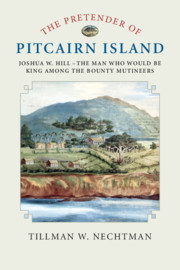 The Pretender of Pitcairn Island
The Pretender of Pitcairn Island Book contents
- The Pretender of Pitcairn Island
- The Pretender of Pitcairn Island
- Copyright page
- Dedication
- Epigraph
- Contents
- Figures
- Acknowledgments
- Abbreviations
- Prologue: Telling Tales of the South Pacific
- 1 The Masquerade
- 2 The Chosen People
- 3 Kingdoms of God
- 4 The Age of Reform
- 5 The Island
- 6 Seduction
- 7 Colonization
- Epilogue: The Self-Constituted King of Pitcairn
- Bibliography
- Index
7 - Colonization
Published online by Cambridge University Press: 27 August 2018
- The Pretender of Pitcairn Island
- The Pretender of Pitcairn Island
- Copyright page
- Dedication
- Epigraph
- Contents
- Figures
- Acknowledgments
- Abbreviations
- Prologue: Telling Tales of the South Pacific
- 1 The Masquerade
- 2 The Chosen People
- 3 Kingdoms of God
- 4 The Age of Reform
- 5 The Island
- 6 Seduction
- 7 Colonization
- Epilogue: The Self-Constituted King of Pitcairn
- Bibliography
- Index
Summary
- Type
- Chapter
- Information
- The Pretender of Pitcairn IslandJoshua W. Hill – The Man Who Would Be King Among the Bounty Mutineers, pp. 259 - 295Publisher: Cambridge University PressPrint publication year: 2018
